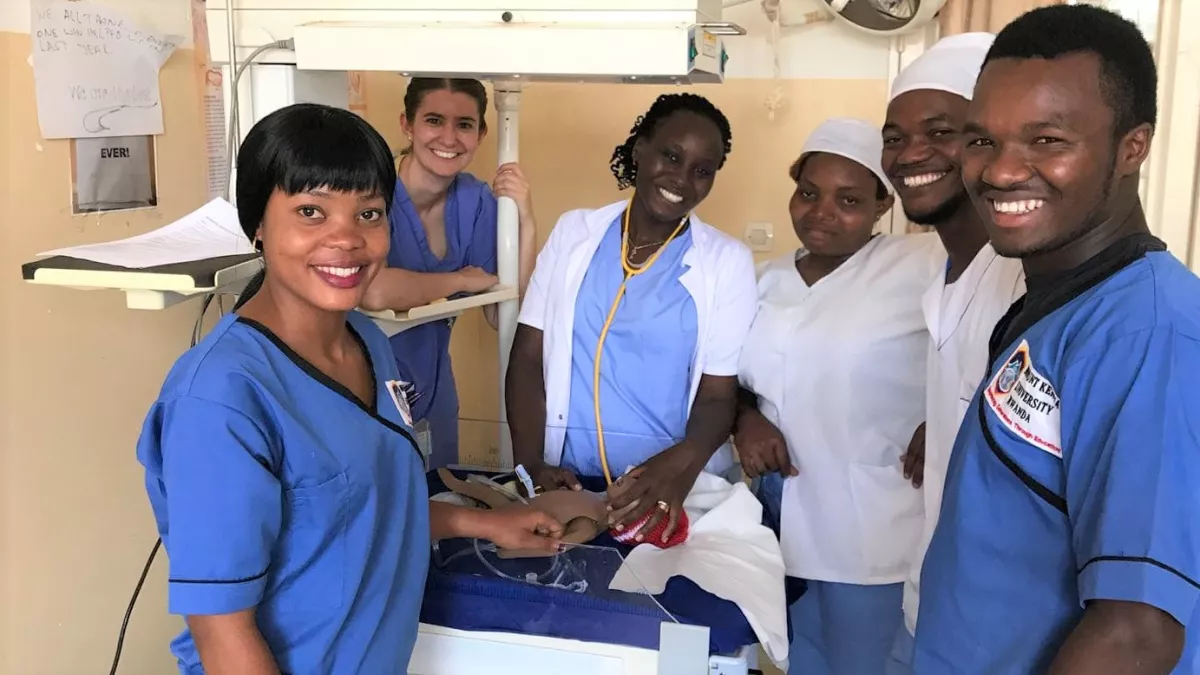
As the worldwide mortality of children under five has fallen by more than 50% in the last two decades, the problem of newborn deaths and stillbirths have emerged as an urgent priority for global child health action.
In 2017, RCPCH Global was invited by the Rwandan Ministry of Health, with financial support from Unicef, to design and deliver a programme of quality improvement targeting neonatal care in a dozen district hospitals across the country. In September of that year, working in partnership with our sister organisation, the Rwandan Paediatric Association (RPA), the programme was launched. UK doctors and nurses - many of them College members - were seconded to each participating hospital for six months to work with RPA to mentor local clinical counterparts.
We are now approaching the end of the first year of the three-year intervention, the Rwanda Neonatal Care Programme (RNCP). With our partners in the Ministry and the UN, our colleagues in international organisations and NGOs and, most importantly, our hospital-based colleagues, we have an opportunity to reflect on the successes and challenges of saving lives at birth in one of the world’s poorest countries.
Building a health system for new generations
And perhaps that is the first thing to note: Rwanda may be economically poor, but its government, ministry and health workforce have demonstrated an iron determination to build a health system capable of shaping new generations equipped not just to survive, but to thrive. Between 2000 and 2015, under the Millennium Development Goals (MDG), Rwanda achieved the highest recorded reduction in child mortality in the world. As progress has been made in child health, attention has turned to the fate of Rwanda’s newborns.
Understanding the true trajectory of neonatal mortality requires years, not months, of data
So what have we seen in the first RNCP hospitals over the course of the first year? First, we have seen newborn mortality falling in programme facilities, comparing pre-intervention with the current period. This is encouraging, but we cannot be complacent. Understanding the true trajectory of neonatal mortality in Rwandan hospitals requires years, not months, of data. We know too that changing clinical care practice in these hospitals takes time to embed, to become habit rather than instruction, reflex rather than theoretical knowledge. This means our engagement and our thinking must be similarly long term.
Leadership underpinned by collaboration and trust
We have seen improvement in the knowledge and behaviour of doctors and nurses working with us in each facility – but we have also seen exceptional leadership from hospital directors, supporting their staff in instituting regular cycles of planning, assessment and modification of care on the neonatal unit. That process of learning and adapting, institutionalised within each facility as a self-sustaining engine of quality improvement, is the core objective of all our work.
And the local leadership that keeps the engine working is founded in bonds of open communication, collaborative working and growing trust between programme partners and hospitals operating, often, under enormous pressure.
Perinatal care as a continuum
But perhaps one of the greatest opportunities opened up by our neonatal programme is the evidence it has started to generate of the critical importance of multidisciplinary working – the impossibility of making proper headway in neonatal survival without commensurate and complementary engagement with the quality of maternal care.
Mothers are not always treated as care providers – separated from their babies...
Too often, maternity and neonate are treated as separate issues – sometimes literally, with the maternity ward located at one end of the hospital, and the neonatal unit at the other. On the walk between them, babies get cold. And we see the consequences of this in persisting problems of neonatal hypothermia. Despite the growing global evidence base of the major benefits of early and sustained contact between mother and newborn infant, mothers are not always treated as care providers – separated from their babies, kept out of the newborn unit, sleeping in corridors, struggling to make ends meet while away from their homes, families and work.
We have been able to see how changing these dynamics – strengthening the team working between midwives and nurses, building bridges between maternity and NNU, promoting the active role of mothers on the ward – can and will improve outcomes for all.
And building on these practical insights, with the support of Unicef and the Ministry of Health, RCPCH and RPA joined forces again in 2018 to launch a sister programme targeting improvement in obstetric and midwifery care quality – working in some of the same hospitals receiving RNCP.
The Rwanda Obstetric and Midwifery Programme (ROMP), aligned with RNCP, constitutes a major advance in maternal and child care thinking in Rwanda. Through continuing consultation with the Royal Colleges of Obstetrics and Gynaecology, Nursing and Midwives in the UK, and their counterpart associations in Rwanda, RCPCH Global and RPA have successfully laid the foundations for a consolidated institution vision, in that country, of perinatal care understood as a continuum, with the mother and newborn at the centre.
Can you join us?
We recruit and prepare doctors, nurses and midwives who help us in all aspects of delivering a programme such as RNCP - usually through longer-term placements overseas in our Global Links programme. Why not explore our current and future opportunities on our Global Links programme or contact us at global@rcpch.ac.uk.









